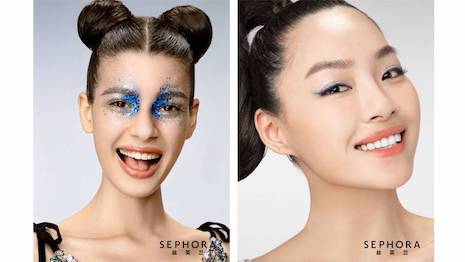 China has become a test tube for digital transitions of physical events as the COVID-19 lockdowns and bans on large gatherings force marketers such as Sephora to become more creative in their audience engagement. Image courtesy of Sephora, LVMH
China has become a test tube for digital transitions of physical events as the COVID-19 lockdowns and bans on large gatherings force marketers such as Sephora to become more creative in their audience engagement. Image courtesy of Sephora, LVMH
By Marie Driscoll The coronavirus has proved highly disruptive to the luxury industry. In terms of Maslow’s hierarchy of needs, people around the world are currently primarily concerned with physiological needs and safety – considering their own health, the health of their family and friends and the broader community and society as they know it. This brings issues of mortality to the front and center, as consumers prioritize essential purchases to survive the coronavirus crisis. Of course, luxury items do not fall under these priorities. Talk is not cheap We saw early examples of hoarding and price gouging on some items, but by and large, this has since dissipated. Now, people are thinking of the economic impact of the coronavirus, including lost wages and reduced wealth – not an ideal backdrop to drive purchases in the luxury sector. In this environment, Coresight Research has advised clients to engage and communicate with consumers in order to deepen long-term relationships: Sales are inevitably going to suffer in the near term, so ongoing communication with consumers will be key for the future recovery of the luxury sector. The good news is that we are seeing Shanghai returning to some level of normalcy, and shoppers are queuing up to enter luxury flagships. The release of some pent-up luxury demand is a positive, though perhaps unsurprising, sign – but an adverse impact of the coronavirus may be a loss of aspirational shoppers, which will pressure luxury growth in 2020 and likely into 2021. In the United States, unemployment claims are skyrocketing, with more than 30 million filing through last week. European unemployment will likely swell as well. Unemployment obviously heavily affects the disposable income of consumers, which points to reduced demand for luxury products in 2020–21. An equally important factor is consumers’ propensity to shop, employed or otherwise. This is sign of sentiment, confidence and emotional state, which we believe will be restored gradually once the coronavirus pandemic is over, resulting in a U-shaped sales trend for global luxury goods, rather than a V-shape return to growth. The weakened macroeconomic backdrop, along with consumer uncertainty spanning employment, income, health and wealth, will reduce the number of aspirational shoppers that luxury brands are able to attract in the near- to medium-term future. No go International travel is virtually at a standstill due to the coronavirus, as is domestic travel. Travel and tourism are important drivers of spending in the luxury sector, and although home quarantines will come to an end at some point, we believe that people will remain reluctant to travel internationally for some time, particularly given that 14-day quarantine measures are likely to remain in place for travelers from some regions. Visits to international luxury flagship locations will be reduced. IN SUM, with the exclusion of the Chinese luxury shopper, most of the levers of luxury demand are on mute. Furthermore, while Chinese luxury shoppers are now returning to stores, traffic has not yet restored to year-ago levels – which were hit by the China-U.S. trade war. The coronavirus has impacted portions of the luxury supply chain as well. With France and Italy on lockdown, many of the top global luxury brands are unable to manufacture product even if they so desired. Representing a silver lining during this situation, many of these brands have used their manufacturing facilities to produce items that contribute to the fight against the coronavirus, such as hand sanitizer, masks and other PPE equipment for medical staff. Taking such action should help brands to build on their reputations and brand equity in a time when they sales are down. Following the coronavirus crisis, we believe that the supply chains in the luxury sector will recover before demand returns.
 Marie Driscoll
Marie Driscoll
